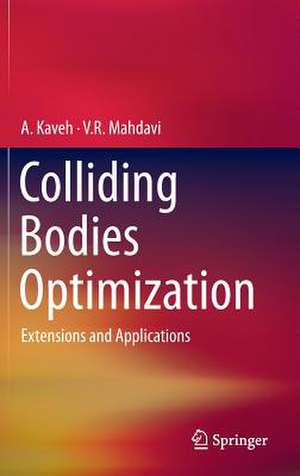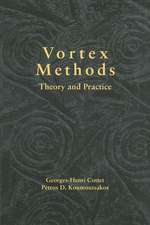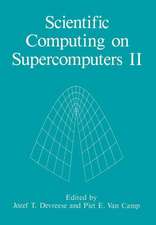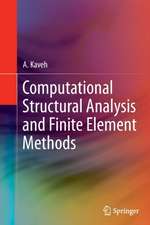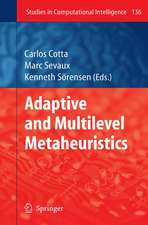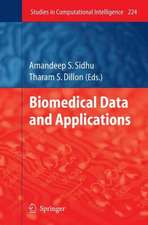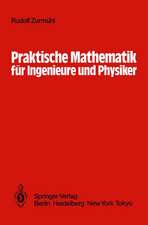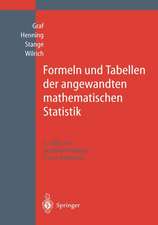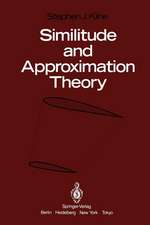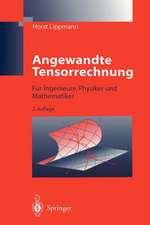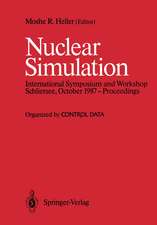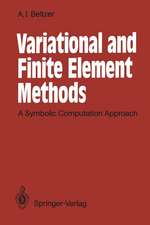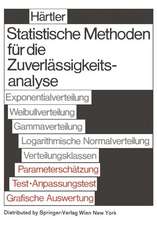Colliding Bodies Optimization: Extensions and Applications
Autor A. Kaveh, V.R. Mahdavien Limba Engleză Hardback – 29 iun 2015
This algorithm is based on one-dimensional collisions between bodies, with each agent solution being considered as an object or body with mass. After a collision of two moving bodies with specified masses and velocities, these bodies again separate, with new velocities. This collision causes the agents to move toward better positions in the search space.
The main algorithm (CBO) is internally parameter independent, setting it apart from previously developed meta-heuristics. This algorithm is enhanced (ECBO) for more efficient applications in the optimal design of structures.
The algorithms are implemented in standard computer programming languages (MATLAB and C++) and two main codes are provided for ease of use.
| Toate formatele și edițiile | Preț | Express |
|---|---|---|
| Paperback (1) | 640.55 lei 6-8 săpt. | |
| Springer International Publishing – 17 oct 2016 | 640.55 lei 6-8 săpt. | |
| Hardback (1) | 646.75 lei 6-8 săpt. | |
| Springer International Publishing – 29 iun 2015 | 646.75 lei 6-8 săpt. |
Preț: 646.75 lei
Preț vechi: 760.88 lei
-15% Nou
Puncte Express: 970
Preț estimativ în valută:
123.77€ • 128.74$ • 102.18£
123.77€ • 128.74$ • 102.18£
Carte tipărită la comandă
Livrare economică 14-28 aprilie
Preluare comenzi: 021 569.72.76
Specificații
ISBN-13: 9783319196589
ISBN-10: 3319196588
Pagini: 220
Ilustrații: XI, 284 p. 162 illus., 106 illus. in color.
Dimensiuni: 155 x 235 x 25 mm
Greutate: 0.59 kg
Ediția:2015
Editura: Springer International Publishing
Colecția Springer
Locul publicării:Cham, Switzerland
ISBN-10: 3319196588
Pagini: 220
Ilustrații: XI, 284 p. 162 illus., 106 illus. in color.
Dimensiuni: 155 x 235 x 25 mm
Greutate: 0.59 kg
Ediția:2015
Editura: Springer International Publishing
Colecția Springer
Locul publicării:Cham, Switzerland
Public țintă
ResearchCuprins
Theoretical background of the CBO algorithm: Introduction.- Colliding bodies optimization.- Enhanced versions of the CBO algorithm.- CBO for multi-objective optimization problem.- Applications of the CBO: CBO for optimal design of structures with continuous variables.- CBO for optimal design of structures with discrete variables.- Optimum design of castellated beams utilizing CBO.- CBO for optimal design of concrete structures.- CBO for p-median problems.- CBO for structuring sparse matrices.- BCO and ECBO in construction management.- Appendix: Computer codes for colliding bodies optimization and its different variants.
Textul de pe ultima copertă
This book presents and applies a novel efficient meta-heuristic optimization algorithm called Colliding Bodies Optimization (CBO) for various optimization problems. The first part of the book introduces the concepts and methods involved, while the second is devoted to the applications. Though optimal design of structures is the main topic, two chapters on optimal analysis and applications in constructional management are also included.
This algorithm is based on one-dimensional collisions between bodies, with each agent solution being considered as an object or body with mass. After a collision of two moving bodies with specified masses and velocities, these bodies again separate, with new velocities. This collision causes the agents to move toward better positions in the search space.
The main algorithm (CBO) is internally parameter independent, setting it apart from previously developed meta-heuristics. This algorithm is enhanced (ECBO) for more efficient applications in the optimal design of structures.
The algorithms are implemented in standard computer programming languages (MATLAB and C++) and two main codes are provided for ease of use.
This algorithm is based on one-dimensional collisions between bodies, with each agent solution being considered as an object or body with mass. After a collision of two moving bodies with specified masses and velocities, these bodies again separate, with new velocities. This collision causes the agents to move toward better positions in the search space.
The main algorithm (CBO) is internally parameter independent, setting it apart from previously developed meta-heuristics. This algorithm is enhanced (ECBO) for more efficient applications in the optimal design of structures.
The algorithms are implemented in standard computer programming languages (MATLAB and C++) and two main codes are provided for ease of use.
Caracteristici
Presents a novel meta-heuristic optimization algorithm for various optimization problems Presents various applications of the proposed algorithms Compares a number of recently developed meta-heuristic algorithms and their features Includes supplementary material: sn.pub/extras
